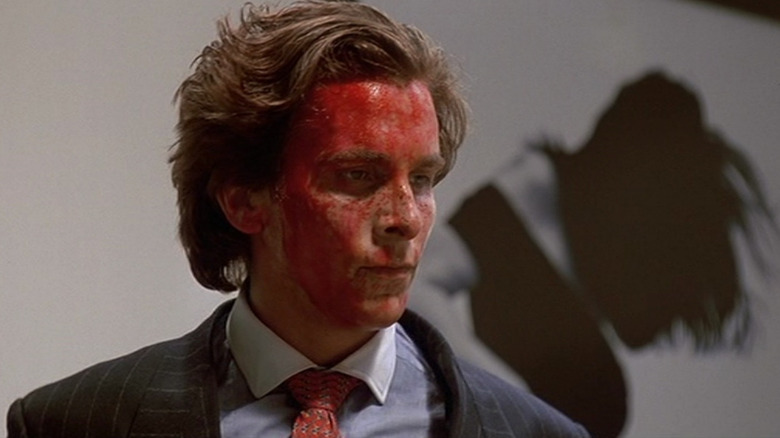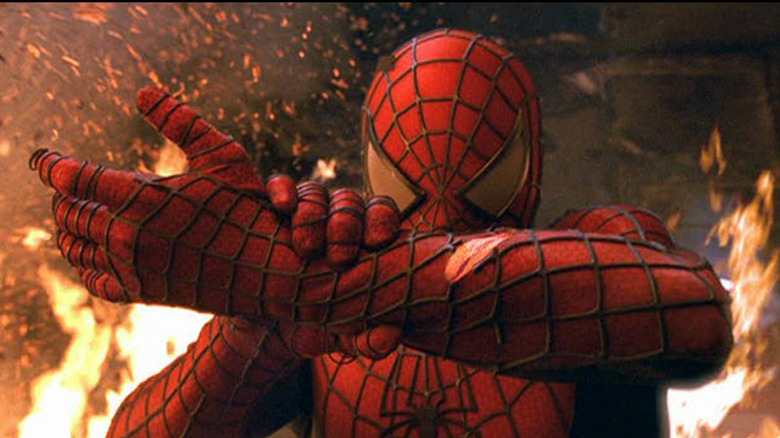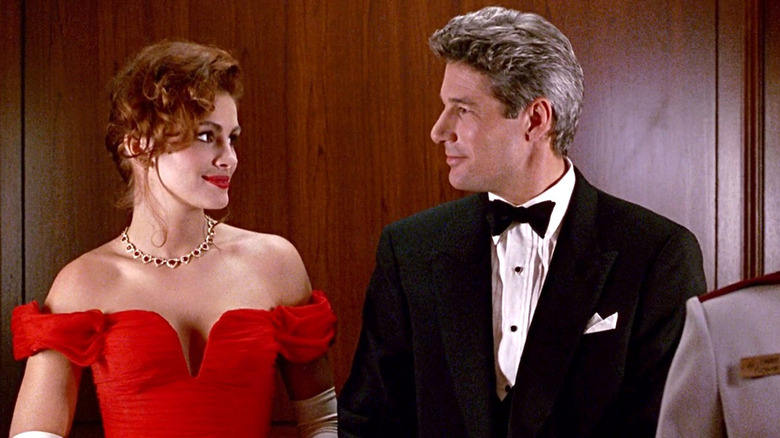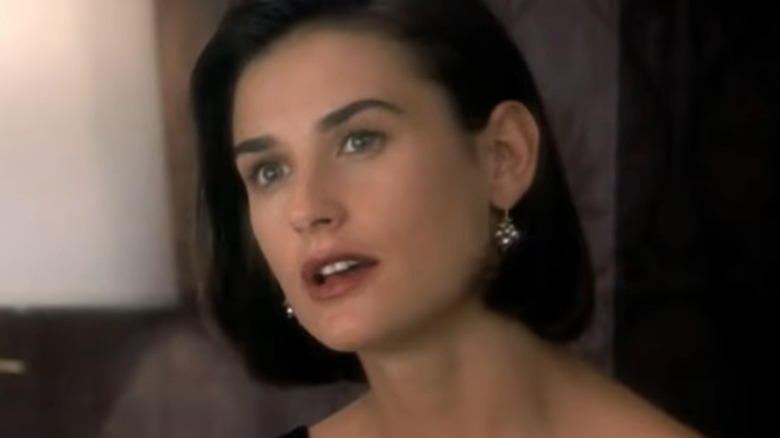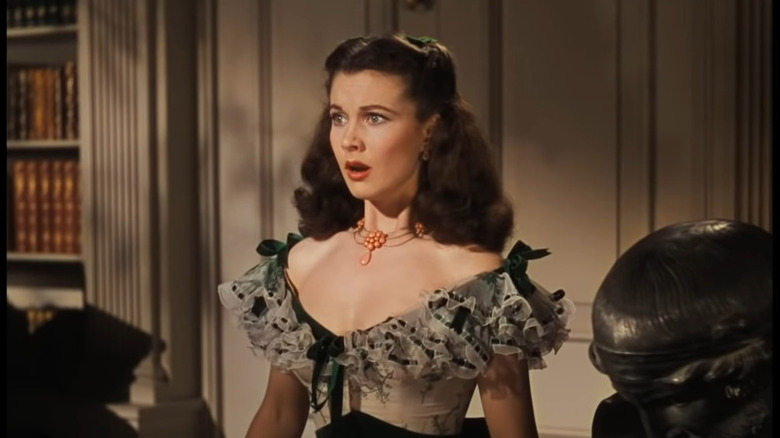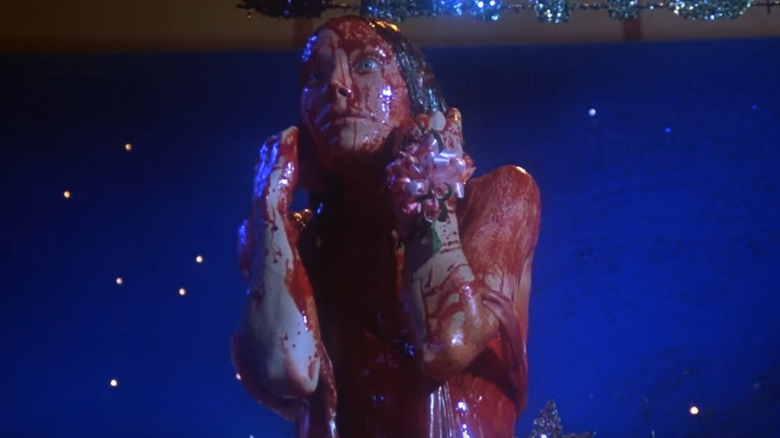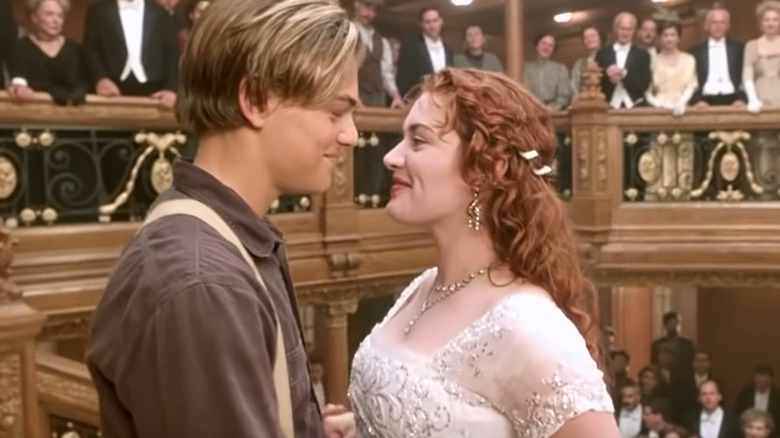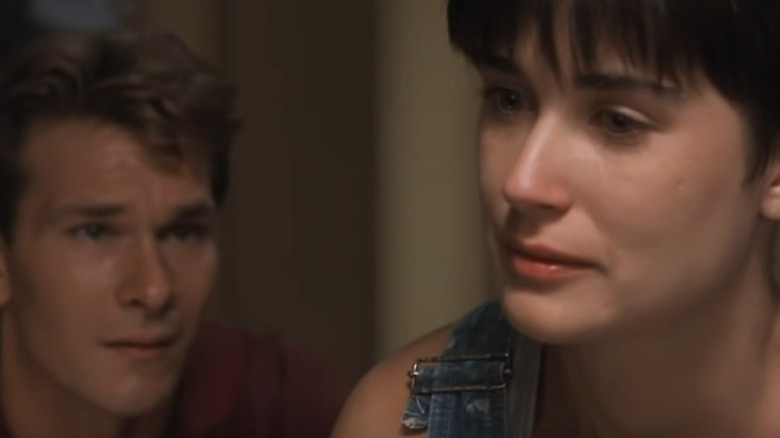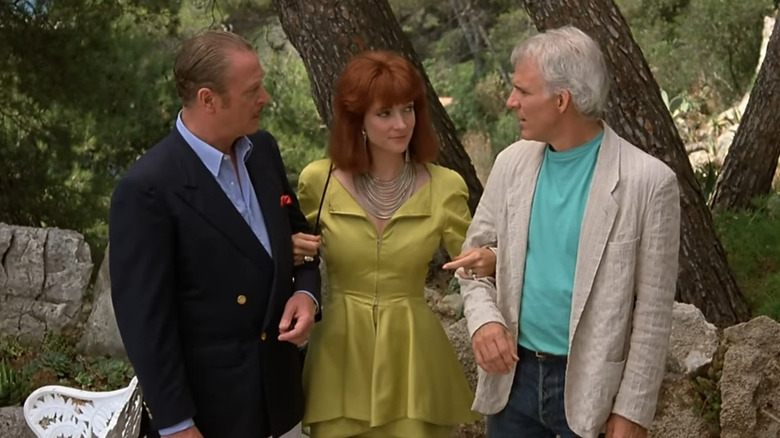Movies That Should Never Have Been Made Into Musicals
Plenty of musicals have gone on to the big screen. "Rent," "Phantom of the Opera," and "Into the Woods" are just a few that have made the jump from Broadway to Hollywood. There are more musicals that are set to join them, like "Wicked," which has fans of the musical delighted. But when putting a musical on screen, screenwriters may have to make some big changes. "Rent," for instance, is an operetta when performed on stage, but the movie version adds some dialogue to piece the story together. It also opens the movie with the iconic "Seasons of Love" and leaves some other songs on the cutting room floor. One of the fears about the movie adaptation of "Into the Woods" was that it would become a watered-down version of the story fans loved, flattening characters like the Wolf or completely removing character deaths in Act II. (Luckily, they were proven wrong.)
When turning a movie into a musical, producers face different challenges, like finding songwriters who can create catchy songs that also reveal character. Sometimes it works; just look at "Waitress," which made the leap to Broadway with music and lyrics by Sara Bareilles and earned rave reviews. Sometimes, though, it really doesn't work. The "why" varies. Sometimes the story falls apart, and in other instances, the music pulls audiences out of the world created on stage.
Let's dig into a few movies that never should have been made into musicals.
American Psycho
Based on the book by Bret Easton Ellis, the film "American Psycho" (2000) stars Christian Bale as '80s yuppie Patrick Bateman, a man obsessed with status and material wealth. (Who doesn't remember the business card scene?) Oh, and he's a serial killer. When the movie came out, critics had mixed reactions. Peter Howell at The Toronto Star wrote, "['American Psycho'] uses intelligent satire to make a pungent statement about the shallowness of modern society." In contrast, Stephanie Zacharek found the movie to be "toothless and empty."
Music plays a key role in the movie, as important (bloody) scenes happen as songs like "Hip to Be Square" by Huey Lewis and the News play. So it's not too far of a stretch to understand why Roberto Aguirre-Sacasa, the playwright, originally wanted to make "American Psycho" a jukebox musical, bringing in songs like "Hungry Like the Wolf" (via Rolling Stone). And then Duncan Sheik, who joined to work on music and lyrics, changed everything. Sheik had a track record of creating rock jams for unlikely material, like the 1891 play "Spring Awakening," which went on to Broadway (and several Tony wins). In bringing new music to "American Psycho," Sheik created a way for audiences to see inside Bateman's mind and heart. The result? Critical reception was mixed, with the Los Angeles Times writing, "This isn't another 'Sweeney Todd,' but its sharp style lifts it above the mercenary rung of most musicals spun from pop cultural ephemera," while the Washington Post described it as "neither scary nor funny."
Spiderman: Turn Off the Dark
Given the number of Marvel movies that have been released since the early 2000s, it's clear that fans have a seemingly endless appetite for new stories featuring their favorite heroes. And "Spiderman" is no exception. But as anyone who has seen the Adam West version of Batman knows, adapting superhero stories can be challenging. Playwright Glen Berger was excited at the prospect of bringing "Spiderman" to audiences. The show seemed primed for success. Director Julie Taymor would lead the show while Bono and the Edge would write the music. By this point, Taymor had directed projects that were bold and innovative, like the stage production of "The Lion King," which used puppetry and masks, as well as the movie musical "Across the Universe." Interested in finding the balance between technology, physicality, and storytelling, Taymor would help Spiderman really swing from the rafters, bringing to life the fantasy that every "Spiderman" fan has had of swinging between buildings.
Taymor worked on the project for nine years. "I love[d] the script. I like[d] the music. Our version was way too long and needed to be cut, but I still think it was a valid story ... and by the end, it was really working," she told Esquire. But before the curtain went up on the show, Taymor was unceremoniously fired. Adding to that, the show was dogged with problems. The show, which required a lot of mechanics to help Spiderman fly through the theater, blew past its original (already high) budget. Several actors were injured during the production as well, with one breaking both of their wrists. When the show finally closed in 2014, Broadway seemed to take a sigh of relief.
Pretty Woman
Musical theater has seen an influx of nostalgia-fueled adaptations in recent years, from "Heathers: The Musical" to the jukebox musical "Jagged Little Pill." "Heathers" revealed one of the challenges of musical adaptation; it had to keep close to the original movie. Entertainment Weekly wrote that "the plot often seems to hinge on the audience's knowledge of the movie, rendering the plot basically inexplicable to anybody who didn't do their homework." The world has also changed a lot since the movie came out in 1988.
"Pretty Woman" as a musical suffers from the same limitations. The musical follows Edward, an '80s corporate raider, who hires Vivian, a sex worker, for a week. As part of their financial agreement, she stays with him in a luxury hotel. He gifts her jewelry and shopping trips. In classic odd-couple, rom-com fashion, the two fall in love by the end of the week. When the movie came out in 1990, Roger Ebert called it "the sweetest and most openhearted love fable since 'The Princess Bride.'"
Yet, when it hit the stage, reviewers found the limits of their nostalgia. The Guardian critiqued the production for not pushing back on Edward's "wide-eyed worship of wealth," as the show "makes no apology for the idea that everything — even love — emanates from the exchange of cold, hard cash." The Hollywood Reporter noted that "there's something inescapably queasy about a woman perceived as low-class trash who gets her revenge against the snooty shopgirls that discriminate against her by flashing pricey merchandise purchased with the credit card of the rich guy paying for her services."
Indecent Proposal
Movie fans may know "Indecent Proposal" as the 1993 movie featuring Demi Moore, Woody Harrelson, and Robert Redford. In the movie, Diana (Moore) and David (Harrelson) are in love but financially struggling. John Gage (Redford) approaches them and makes a proposition: He'll pay $1 million to spend a night with Diana. Will she do it? "Indecent Proposal" did well at the box office, but critics panned the movie. Robert Ebert called it "artificial and manipulative." The movie also won a Razzie in 1994 for the worst film.
And yet, the story's central premise drew Michael Conley, who wrote the lyrics for the musical, in. He was fascinated with "the ramifications of the proposal and the decision either way." He had experience creating characters who grapple with the tension between love and money. He wrote "The Sorrows of Satan," about a playwright who must decide whether to stay true to his artistic vision or let a producer change it (while cutting him a check). The Guardian called the musical "light, witty, and devilishly delivered." And like "Indecent Proposal," it is also based on another text. Conley used the eponymous book, not the movie, as his source material for "Indecent Proposal."
However, reviewers found that the show missed the opportunity to grapple with questions of patriarchy and class — and as a result, fell flat. As BroadwayWorld reviewer Gary Naylor pointed out, "Sure there's money [versus] love, but there's little unpacking of that calculus, just a lot of shouty emoting."
Gone With the Wind
A quick debrief for anyone who hasn't read the book or seen the movie: "Gone With the Wind," starring Clark Gable and Vivian Leigh, is a doomed love story between Scarlett O' Hara (Leigh) and Rhett Butler (Gable) against the backdrop of the Civil War and reconstruction in the South. When the movie came out in 1939, it was a smash hit. And: the movie sets up the Confederacy as an underdog fighting against the Union soldiers. It has been accused of "romantic[izing] the Confederacy in a way that continues to give legitimacy to the notion that the secessionist movement was something more, or better, or nobler than what it was — a bloody insurrection to maintain the 'right' to own, sell and buy human beings," as screenwriter John Ridley put it in his open letter to HBO Max requesting that the streaming service remove the movie from its library.
That's all the reason one would need not to stage this as a musical. And yet! "Gone with the Wind" has been made into a musical several times. In 1973, the story was brought to the stage in Los Angeles with Lesley Ann Warren playing Scarlett and Pernell Roberts playing Rhett. In 2008, "Gone With the Wind" opened at the New London Theatre, which felt "doomed from the get-go," per the New York Times. Its most recent iteration took place in South Korea in 2015, featuring K-pop star Seohyun in the role of Scarlett O'Hara.
Carrie
There are few musicals that can successfully combine song and dance with bloodshed. Take "Sweeney Todd: The Demon Barber of Fleet Street." Steven Sondheim, who wrote the music and lyrics of "Sweeney," referred to the story as a "musical thriller." It's a masterpiece! But not every bloody thriller or horror story should be set to music — like "Carrie," adapted from the film made in 1976.
The movie, based on Stephen King's novel, is considered a classic. It follows Carrie (Sissy Spacek, in a role that earned her an Oscar nod) as a young girl bullied at school by the popular kids and at home by her religious mother (Piper Laurie). She slowly develops telekinetic powers. After a gruesome, bloody prank at prom, she uses them to get back at her bullies. Critics write about how chilling the movie is, even now.
But as a musical, the story never seems to find its footing. It was once staged in 1988 but closed after just 16 preview performances (via The New York Times). The show was revived by its original creators for an off-Broadway run in 2012 to "rescue 'Carrie' from oblivion and to give her new life," per Playbill. In 2015, "Carrie" returned with creative staging to create an immersive experience. But the music made the experience lackluster. The Hollywood Reporter described the score as "a form of undiluted auditory vanilla so bland it's practically white noise."
Titanic
Imagine a world before James Cameron's "Titanic." The tragic story of an unsinkable steamship in 1912 hitting an iceberg and sinking on its maiden voyage sounds like a Greek myth meant to revel in human folly, which is perhaps why it endlessly fascinates us. Peter Stone, who wrote "Will Rogers Follies" and "1776," was fascinated by the Titanic story. He saw that, even with advanced technology, we are always at the mercy of the natural elements. "[D]isasters like the Titanic teach people that nature is still dominant and that man is still ill-prepared to take on the role of God," he told the Baltimore Sun. He went on to write the book for the "disaster musical," incorporating the stories of real passengers, like Benjamin Guggenheim.
On April, 23, 1997, "Titanic: The Musical" premiered. Just two months later, Life Magazine ran a cover with "Titanic Fever" splashed across it. Audiences met Rose (Kate Winslet) and Jack (Leo DiCaprio) in December 1997.
When the show first opened, The New York Times called the show "hokey." The paper also reported that the musical had cost $10 million to stage and ran into a long list of production snafus. And yet, the show's premise surprised audiences. One reviewer noted that the show has "one of the most majestic musical scores ever written for a Broadway stage" (via BroadwayWorld). With gorgeous music and an awe-inspiring set, the show would go on to win the Tony for Best Musical and play for over 800 performances.
King Kong
There are many musicals that add wonder by way of amazing set design and use of puppets, like the recent production of "Into the Woods." But ultimately, a musical adaptation of a movie needs to add something that was missing in the original text.
"King Kong" has been remade several times on film. First created in 1933 as a rote creature thriller, it became a closer look at a complex, emotional animal in Peter Jackson's 2005 version. That emotion, in theory, can serve as the base for a compelling musical, as noted by Kaitlyn Milligan for BroadwayWorld. Sonny Tilders, who created the giant Gorilla puppet, had the same feeling. "The whole idea of the musical was, 'Let's do something that really takes puppetry beyond spectacle to story and narrative,'" he told Playbill.
Tilders certainly rose to the challenge. The final Kong puppet stood 20 feet tall and weighed 2,000 pounds. The puppet in motion was a wonder. It took 10 performers to move Kong around on stage and four "Voodoo" artists to create different facial expressions. But even a puppeteering feat may not be a good enough reason to bring this show to Broadway from Melbourne. The show underwent a rewrite before it came to Broadway, and according to the New York Times, ended up with two competing stories. This is just one of the reasons that the Times found the show to come up short, noting the "oppressiveness of the music and the over-intensity of the staging."
Ghost
When "Ghost" came out in 1990, audiences loved it. Critics, on the other hand, were less enthused (via Entertainment Weekly). The story follows Sam Wheat (Patrick Swayze) and Molly (Demi Moore), a young couple in love. When he's killed tragically, Sam comes back as a ghost to protect Molly with the help of psychic Oda Mae Brown (Whoopi Goldberg). The movie was nominated for a slew of awards, with Goldberg winning the Academy Award for best actress in a Supporting Role and Bruce Joel Rubin snagged the award for best writing.
The heavy emotion that led to audiences weeping seemed like the perfect reason to make it into a musical, as Dave Stewart, who co-wrote the songs for the musical, told the BBC: "[Sam's] quest to be able to tell her that he loved her and he's trapped in this in-between world — [music] just lent itself really well to it."
However, in the 2011 review, the Guardian's Michael Billington noted how the musical "suffers by comparison to the movie." While Rubin also wrote the book to the musical, the visuals of Manhattan – brought to life by giant screens that surround the stage — seem to overshadow the actors. Add to that the "strangely forgettable" songs, and "Ghost: The Musical" seems like it's not meant for this world.
Dirty Rotten Scoundrels
If you want a comedic escapist movie, "Dirty Rotten Scoundrels" is hard to beat. The movie follows two con artists played by Michael Caine and Steve Martin as they attempt to con their way across the French Riviera. The Washington Post raved about the comedic duo and how "[t]heir corruption has a glorious purity. They're rats, clean through." But the two get a run for their money when they attempt to steal $50,000 from Janet Colgate (Glenne Headly), and hilarity ensues.
The movie made the jump to Broadway in 2005 after MGM invited writers to peruse their film catalog to see if there were any titles that producers, writers, or directors would be interested in bringing to Broadway. Lo, David Yazbek, of "Full Monty" fame, was one of the people interested. In the Broadway version, John Lithgow and Leo Nobert Butz play the two con men. (Saavy musical theater fans may recognize Butz as the original Fiyero from "Wicked.") "Dirty Rotten Scoundrels" as a musical kept the same buddy-comedy premise as the movie. Perhaps, as a result, New York Magazine found that "there are no songs that transcend the serviceable into the memorable."

